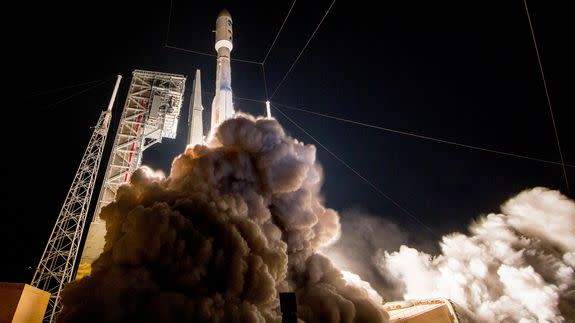This rocket company clearly wants to be as cool as SpaceX

The private spaceflight company United Launch Alliance (ULA) usually plays the stodgy uncle to Elon Musk's young, swaggering SpaceX. Where SpaceX touts its Silicon Valley-style disruption of the commercial rocket market, ULA prides itself on its reliability.
"Someday I expect the rest of the industry will become as reliable as we are," ULA CEO Tory Bruno, said in a press conference Wednesday, throwing a little implied shade at the competition.
But now, ULA wants to be the cool kid on the rocket-building block. To do so, ULA has launched a new website to let you virtually build and order your own rocket — assuming you have about $100 million sitting around.
SEE ALSO: SpaceX's bold plan to deliver worldwide internet with 4,425 satellites
ULA's RocketBuilder.com is set up to let potential customers — or anyone else really — build the rocket they need to launch whatever payload they have to a designated orbit.
You start off by picking your launch date, orbit and payload weight. From there, the tool adjusts costs based on the configuration of the Atlas V rocket and insurance needed to fly the craft safely.

Image: ULA
“RocketBuilder not only educates our customers on the different launch service options and costs, it can also serve as an educational reference for students, teachers, or anyone with an interest in rockets and space,” Bruno said in a statement.
“Ultimately, RocketBuilder will help drive down costs even further as customers are able to optimize the cost-effectiveness of their designs.”
Before this tool became available, it took weeks or even months for customers to get a proper estimate for what a rocket launch would cost with ULA. Now, companies can pack all of that work into hours spent on a computer.

Image: ULA
RocketBuilder is also tied to the company's launch manifest, so customers will have some sense for when their rocket can be scheduled for flight.
There aren't necessarily a huge number of commercial entities that actually want to launch their wares to space with ULA each year.
The company, a joint venture of Lockheed Martin and Boeing, actually does much of its business with government entities, which likely won't be able to use the Rocket Builder tool because of other costs (as well as secrecy) associated with government launches.

Image: ULA
However, this new web portal is about more than just providing a service to their customers. According to Bruno, ULA is hoping to use Rocket Builder as part of the company's wider mission to make space more accessible.
A major part of ULA's image hinges on the idea of transparency. People hoping to fly their expensive payloads with ULA will now have the chance to see exactly how much it will cost to launch and insure one of the company's rockets.
"It's really about that longer-term vision of seeing space become more available to people and more and more economic activity in space," Bruno said.
This goal isn't singular to ULA, however.
SpaceX and Jeff Bezos' space outfit Blue Origin both have the stated goal of making space more open for all as well.
Blue Origin and SpaceX are going about it in a slightly different way. Neither company has created a web portal for their launches, but both are aiming for reusability in their rockets. If you can recycle rocket parts that are usually lost after performing their jobs, it will go a long way toward reducing the cost of access to space.
ULA, for its part, is also hoping to produce a fleet of reusable rockets as well with its new Vulcan program expected to fly in the coming years.
